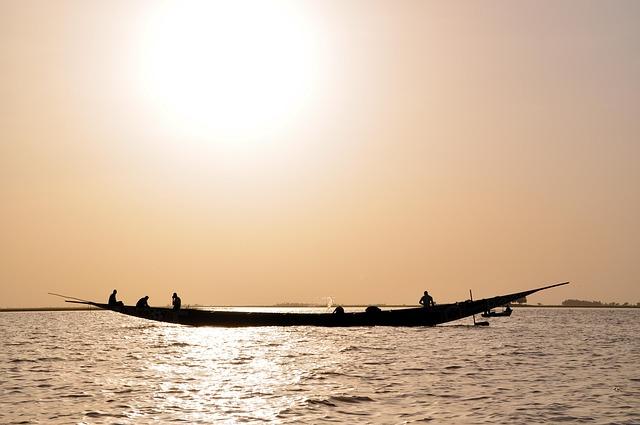In a rapidly evolving geopolitical landscape, the recent coup in Niger has drawn sharp international scrutiny and concern. U.S. Secretary of State Antony Blinken has expressed alarm over the implications of this upheaval, particularly highlighting the role of the Wagner Group, a russian paramilitary association, in exploiting the chaos. As Niger grapples with the fallout from the overthrow of its government, questions arise about regional stability and the potential for foreign powers to increase their influence amid uncertainty.This article delves into the intricacies of the Niger coup, the strategic interests of the Wagner Group, and the broader repercussions for West Africa and the international community.
Niger’s Political Turmoil: A Breeding Ground for External Influence
The recent upheaval in Niger has created a power vacuum that is drawing the attention of numerous external actors, notably the Wagner Group. As the country grapples with political instability following the coup, foreign entities are seizing the opportunity to expand their influence in the region. The U.S.Secretary of State, Antony Blinken, underscored these concerns, expressing apprehension about how the chaos could facilitate infiltration by mercenary groups, particularly those with shadowy affiliations. This scenario poses a dual threat: not only does it jeopardize Niger’s sovereignty, but it also risks escalating conflicts in an already volatile Sahel region.
In the midst of the turmoil,the emergence of groups like Wagner has raised alarm bells regarding their motivations and potential actions. Such external influences often exacerbate local tensions and complicate efforts for stabilization. Key points highlighting their involvement include:
- Exploiting Power Vacuums: mercenary groups thrive in regions lacking strong governance.
- Resource Control: Their interests align with seizing natural resources, creating economic dependencies.
- Shifting Alliances: Alliances can quickly shift, complicating diplomatic efforts.
| External Actor | potential Impact |
|---|---|
| Wagner Group | Increased militarization and instability |
| Foreign Governments | Diplomatic tensions and intervention risks |
| Local Militias | Escalated violence and chaos |

wagner Group’s Expanding Role in Niger’s Security Landscape
The Wagner Group has strategically positioned itself to exploit the instability following the recent coup in Niger, raising concerns among international observers and regional stakeholders. This private military company, closely affiliated with the Russian government, is seen as leveraging the security vacuum created by the coup to expand its influence across the Sahel region. With Niger being a pivotal player in the fight against jihadist groups, the presence of Wagner forces could exacerbate existing tensions and complicate international efforts aimed at restoring order and stability. key implications of this development include:
- Increased Threat Levels: The introduction of Wagner’s operatives could lead to heightened violence against both local populations and international missions.
- Shifts in Alliances: The collaboration between Wagner and local military leaders might result in new power dynamics that challenge existing governance.
- Geopolitical Ramifications: Russia’s growing foothold may prompt Western nations to reevaluate their strategies in the region.
As the situation evolves, the potential for Wagner’s involvement in Niger raises critical questions about the broader security landscape in West Africa. The group‚Äôs activities could undermine regional stability by fostering a cycle of violence while also disrupting humanitarian efforts aimed at addressing the needs of civilians affected by ongoing conflicts. Additionally, the group’s reputation for operating with minimal oversight may pose risks to human rights and civilian safety. Observers are particularly wary of the implications for local governance, with concerns that administrative structures may be co-opted to facilitate the group‚Äôs goals, as illustrated in the table below:
| Potential impacts | Possible Outcomes |
|---|---|
| Wagner’s Military Engagement | Increased instability and insurgent activity |
| Influence on Local Politics | Shift towards authoritarian governance |
| Human Rights Concerns | Increased civilian casualties and displacement |

the U.S. Response: Antony Blinken’s Call for Stability and Peace
In a recent press conference,U.S. Secretary of State Antony Blinken expressed deep concern over the political turmoil in Niger. He emphasized the meaning of restoring democratic governance and underscored the urgent need for stability in the region. Blinken’s remarks highlighted the potential risks posed by the Wagner Group,notorious for exploiting vulnerabilities in unstable nations. His call for peace aligns with a broader strategy to diplomatically engage with West African nations facing similar crises.This approach is critical, as the resurgence of mercenary forces threatens to disrupt not only Niger but the entire Sahel region.
Blinken outlined several key points in his address, including:
- Support for Democratic Processes: Reinforcement of democratic institutions to curb the influence of non-state actors.
- International Collaboration: A unified stance with international partners to address the root causes of instability.
- Humanitarian Assistance: Increased support for humanitarian initiatives to alleviate the suffering of displaced populations.
To further quantify the impact of international responses, the following table summarizes the U.S. aid initiatives in the Sahel region:
| Initiative | Objective | Funding (2023) |
|---|---|---|
| Governance Support | Strengthening Democratic Institutions | $50 million |
| Emergency Relief Fund | Humanitarian Aid for Displaced Persons | $30 million |
| Counter-Mercenary Operations | Mitigating Threats from Armed Groups | $20 million |

Strategic Recommendations for International Engagement in Niger
In the context of heightened instability in Niger, it is crucial for international actors to reassess their engagement strategies to counteract the influence of groups like Wagner. Multilateral coordination among regional and global powers should be prioritized to establish a cohesive response that addresses both security and humanitarian concerns. Key recommendations include:
- Enhancing Diplomatic Efforts: Foster dialog with local stakeholders and maintain open lines of dialogue to better understand the grassroots dynamics at play.
- Supporting Regional Institutions: Bolster the capacity of the Economic Community of West African States (ECOWAS) and the African Union to mediate conflicts and support democratic governance in Niger.
- Promoting Economic Resilience: Implement initiatives that strengthen economic opportunities, helping communities to withstand the allure of extremist figures such as those affiliated with Wagner.
Moreover, a concerted effort must be made to ensure that aid and intervention strategies are sensitive to the local context, prioritizing the involvement of Nigerien civil society. Establishing safeguards to prevent external actors from exploiting the situation is critical. A suggested framework for international engagement could include:
| Strategy | Description |
|---|---|
| Capacity Building | Train local law enforcement and political leaders in governance and conflict resolution. |
| Civil Society Engagement | Support local NGOs and community groups to foster resilience and advocacy. |
| Details Sharing | Facilitate intelligence-sharing agreements to monitor and counteract external threats. |

Addressing regional Implications of the Niger Coup: A Collective Approach
The recent coup in Niger has heightened concerns about regional instability, presenting a complex landscape that demands a unified response from neighboring countries and international stakeholders. with the absence of a stable government, various non-state actors, including the Wagner Group, are likely to exploit the chaos in pursuit of their agendas. To effectively counter this threat and restore order, collaboration among regional entities such as ECOWAS and the african Union is crucial. A focused strategy involving diplomatic dialogue, economic support, and military cooperation could foster a more resilient regional framework. The overarching goal should be to engage Mali, Burkina Faso, and other impacted nations in a constructive dialogue, promoting stability and discouraging extremist activities.
Addressing the repercussions of the coup involves not only immediate security measures but also long-term developmental initiatives. Key areas for intervention include:
- Enhancing governance structures to ensure accountability.
- Investing in education and economic opportunities to mitigate the appeal of extremist ideologies.
- Facilitating regional cooperation on intelligence sharing and military resources to combat transnational threats.
A concerted effort aimed at rebuilding trust and strengthening institutions will be essential for preventing future unrest. Furthermore, maintaining an ongoing dialogue with international partners can help establish a framework for sustainable peace and stability throughout the region.

Strengthening Democratic Institutions: Lessons from Niger’s Crisis
The recent political upheaval in Niger serves as a critical reminder of the fragility of democratic institutions in regions facing instability. The coup has not only disrupted governance but has also created a vacuum that opportunistic groups, such as the Wagner Group, are eager to exploit. Restoring stability and strengthening democratic frameworks in the aftermath of such crises is not merely a local concern but a regional imperative. By reinforcing the foundations of democracy, nations can mitigate the influence of external actors looking to capitalize on chaos. Effective measures include:
- Engagement with Civil Society: Encouraging active participation from civil society organizations can fortify public trust and ensure that citizens’ voices are integrated into governance.
- Support for Rule of Law: Strengthening legal institutions can provide a barrier against unlawful actions and ensure accountability through transparent judicial processes.
- International Cooperation: Collaborating with regional and international partners can provide essential resources and expertise to uphold democratic values.
Furthermore, lessons from Niger also highlight the necessity of adapting to evolving geopolitical dynamics. Investing in civic education can empower citizens to understand their rights and responsibilities, leading to a more informed electorate resistant to manipulation. Here’s a table summarizing potential strategies to enhance democracy in tumultuous contexts:
| Strategy | Description |
|---|---|
| Community Engagement | Fostering active participation in local governance to build trust and accountability. |
| education Initiatives | Implementing programs to educate citizens about democratic processes and rights. |
| Strengthened Security | Ensuring that security forces uphold human rights and protect democratic institutions. |
Closing Remarks
the unfolding situation in Niger highlights the precarious balance of power in the Sahel region and the broader implications for international relations. As Antony Blinken pointed out, the involvement of the Wagner Group amid the ongoing instability presents not only challenges for Niger but also risks destabilizing neighboring nations. This development underscores the urgent need for renewed diplomatic efforts and cooperation among international partners to address the root causes of unrest and to support the aspirations of the Nigerien people for democratic governance and security. The coming weeks will be crucial in determining whether Niger can navigate this turmoil and reclaim its path towards stability, or if external actors will further complicate an already volatile landscape. As the situation evolves, staying informed and vigilant is essential for understanding how these events will shape the future of West Africa and global geopolitics at large.







